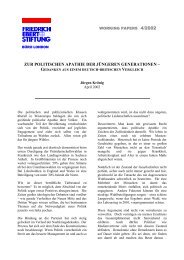Where Now for European Social Democracy? - Policy Network
Where Now for European Social Democracy? - Policy Network
Where Now for European Social Democracy? - Policy Network
Create successful ePaper yourself
Turn your PDF publications into a flip-book with our unique Google optimized e-Paper software.
102WHERE NOW FOR EUROPEAN SOCIAL DEMOCRACY?4Strauss-Kahn D., La Flamme et la Cendre, Paris, 2002.5Aghion P. and Cohen E., Education et croissance, report of the French Council ofEconomic Analysis, 2004.Roger Liddle1Report from the Commission to the Spring <strong>European</strong> Council: Delivering Lisbon:Re<strong>for</strong>ms to the Enlarged Union’, 21/01/04 COM (2004) 29, Brussels, p.7.2Ibid, p.9.3See Jean Pisani-Ferry’s paper in: Sapir A. et al., An Agenda <strong>for</strong> a Growing Europe,Ox<strong>for</strong>d, <strong>for</strong>thcoming 2004.4Sapir, p. 29.5Sapir, p. 94.6Beveridge W., Full Employment in a Free Society, London, 1944.7The Lambert Review of Business-University Collaboration, HM Treasury, December20038Kok W., ed., Jobs, Jobs, Jobs: Creating more employment in Europe, Brussels,2003.9The Strategic Audit, Prime Minister’s Strategy Unit, November 2003.10Baymoumi, Laxton and Pensenti, When Leaner Isn’t Meaner: Measuring Benefitsand Spillovers of Greater Competition in Europe, IMF, October 2003.11Sapir, pp. 148-150.Marisol Touraine1This paper only considers civil insecurities, which has come under renewed focusin recent years. If social policy is not enough to reduce civil insecurity the reverseis also true.2It was in Germany in the 1880s that Bismarck first introduced the first nationalsystem of protection against mis<strong>for</strong>tune. Great Britain paved the way with thePoor Law Amendment Act of 1834 be<strong>for</strong>e engaging in a much wider policy at thebeginning of the twentieth century. France was much later in introducing a systemof social insurance. The first half of the twentieth century was characterised bythe extension of these guarantees.3Gøsta Esping Andersen distinguishes three main categories of Welfare States:corporatist-conservative systems, rooted in the traditions of Bismarck, i.e. Germany,Luxemburg or Belgium; Beveridge style systems as the United Kingdom andIreland; and the social democratic system that prevails in Scandinavia. France isa hybrid case: Bismarckian in the setting down of open rights, Beveridgian inits universalism.4Beck U., Risk Society, London, 1992. See also Gautié J., ‘Marché du travail etparcours individuals’, Esprit, November 2003.5Giddens A., Modernity and Self-Identity, Stan<strong>for</strong>d, 1991; Beck ibid.6Supiot A., Au delà de l’emploi, Paris, 1990.7Regan S., Assets and Progressive Welfare, London, 2001.



